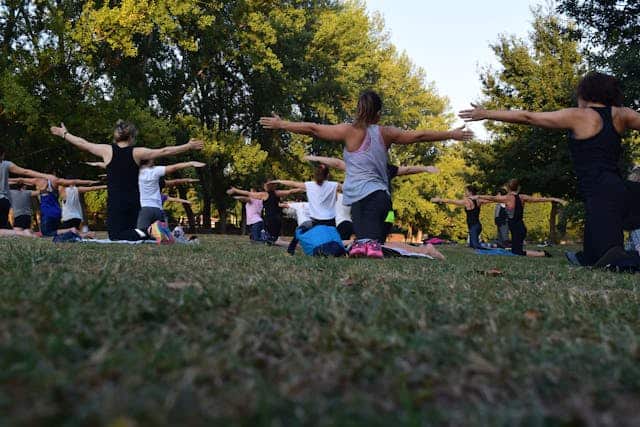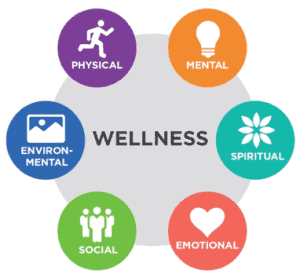What Are the Five Components of Health and Wellness?
Deprecated: preg_split(): Passing null to parameter #3 ($limit) of type int is deprecated in /home/dailwtkh/public_html/wp-content/themes/jannah/framework/functions/post-functions.php on line 863

In a world where the desire for wellness is critical, everyone needs to know the five components of health and wellness. These different aspects (physical, mental, and emotional well-being) of wellness support the overarching theme of feeling healthy overall. These ingredients when consumed make life a perfect and contented recipe.
Five Components of Health and Wellness
1. Physical Health: The Foundation of Well-Being

Physical wellness is the keystone of general health. It describes the problem of your body as well as its capability to operate efficiently. Keeping physical wellness includes numerous vital methods:
Nourishment
- A well-balanced diet regimen is abundant in crucial nutrients that gases the body as well as sustains its features. Secret aspects of a healthy diet plan consist of:
- Carbohydrates, healthy proteins, and also fats give power as well as assistance in development plus repair work.
- Vitamins as well as minerals necessary for different organic procedures.
- Suitable water consumption is critical for maintaining physical features and also general health and wellness.
Exercise
Routine exercise enhances the cardio system, and muscular tissues, coupled with bones. It likewise aids preserve a healthy and balanced weight, increases resistance, as well as enhances psychological wellness. Recommended tasks include:
- Activities such as strolling, running plus swimming boost heart price plus endurance.
- Exercises like weight training that construct muscular tissue mass together with stamina.
- Practices such as yoga exercises along with extending improve adaptability and also avoid injuries.
Rest & Sleep
- Quality sleep is necessary for physical wellness. It enables the body to fix and also renew. Secret techniques completely rest health consist of:
- Going to bed as well as getting up at the exact same time every day.
- Creating a peaceful, dark plus awesome resting room.: Engaging in unwinding tasks before going to bed.
Preventive Care
- Having routine check-ups and screenings helps in the early detection and prevention of health problems.
- Vaccinations, dental care, and eye exams are also critical components of preventive care.
2. Mental Health: The Pillar of Cognitive Functioning
Mental health involves cognitive processes that influence how we think, learn, and remember. It encompasses our ability to process information, solve problems, and make decisions.
Cognitive Health
Maintaining cognitive health involves:
- Engaging in continuous education and mental challenges.
- Consuming foods rich in antioxidants, healthy fats, and essential nutrients.
- Activities such as puzzles, reading, and games that stimulate the brain.
Stress Management
Chronic stress can impair cognitive function and overall mental health. Effective stress management techniques include:
- Do mindfulness and meditation practices that promote relaxation and focus.
- Organizing tasks to avoid feeling overwhelmed.
- Engaging in enjoyable activities to relax and recharge.
Emotional Resilience
Building emotional resilience helps cope with life’s challenges. Key strategies include:
- Developing a positive mindset and an attitude.
- Developing skills to manage and express emotions constructively.
- Building strong relationships for emotional support.
3. Emotional Health: The Heart of Personal Well-Being
Emotional health is the ability to understand and manage one’s emotions. It affects our attitude, relationships, and overall outlook on life.
Self-Awareness
The backbone of emotional wellness is self-awareness. It includes:
- Looking into how feelings influence behavior and decisions.
- The ability to identify and understand one’s emotional condition
- Being kind and understanding towards oneself.
Emotional Regulation
Techniques include:
- Focusing on the present moment without judgment.
- Changing negative thought patterns.
- Relaxation activities including deep breathing and muscular relaxation.
Building Emotional Intelligence
Understanding and managing emotions in oneself and others, including tasks:
- Understanding and sharing the feelings of others.
- Building healthy relationships and communicating effectively.
- Cultivating a positive attitude and perseverance.
4. Social Health: The Fabric of Human Connection
Social health involves the quality of our relationships and social interactions. It contributes to overall well-being by providing support, companionship, and a sense of belonging.
Building Healthy Relationships
Strong, positive relationships are vital for social health. Tips for nurturing these relationships include:
- Effective Communication is key. Listening actively and expressing oneself clearly.
- Building trust and showing respect in all interactions.
- Offering and seeking support when needed.
Community Engagement
Engaging with the community fosters social health by creating connections and a sense of purpose, involves:
- Participating in social community service and helping others.
- Joining social clubs, organizations, or groups that align with your interests.
- Attending community events and activities.
Social Skills Development
Developing social skills enhances our ability to interact positively with others. Key skills include:
- Managing and resolving disagreements constructively.
- Working effectively with others towards common goals.
- Adjusting to different social situations and dynamics.
5. Spiritual Health: The Quest for Meaning and Purpose
Spiritual health requires feeling connected to something bigger. It includes values, beliefs, and behaviors that give life meaning.
Exploring Beliefs and Values
Understanding one’s beliefs and values is central to spiritual health. This exploration can involve:
- Engaging in meditation, prayer, or contemplation.
- Learning about different philosophies, religions, and spiritual practices.
- Continuously evolving and refining one’s beliefs and values.
Finding Purpose
A sense of purpose contributes to overall well-being and life satisfaction. Ways to discover and cultivate purpose include:
- Identifying and pursuing meaningful personal and professional goals.
- Engaging in acts of kindness and service.
- Being present and intentional in daily activities.
Spiritual Practices
Regular spiritual practices can enhance spiritual health. These practices vary widely and may include:
- Connecting with a higher power or inner self.
- Spending time in nature to find peace and inspiration.
- Participating in religious or cultural rituals.
Combining the 5 Components: A Holistic Approach to Wellness
Achieving general health and wellness needs incorporating all 5 parts of wellness into everyday life. Below are some practical activities to produce a well-balanced plus alternative method:
1. Develop a Wellness Plan
Create a personalized health strategy that consists of objectives as well as tasks for every element. include:
- Evaluate your physical, psychological, psychological, social as well as spiritual health and wellness.
- Create specific achievable and time-bound objectives.
- Monitor your progression plus readjust your strategy as required.
2. Develop Healthy Habits
To maintain overall health, make healthy and balanced practices a part of your daily routine. Examples include:
- Consume well-balanced nutrition.
- Stay energetic with pleasurable exercises.
- Engage in mindfulness practices to minimize stress and anxiety.
- Encourage social relationships and active engagement in the community.
- Dedicate time to spiritual development and also representation.
3. Look for Support and Resources
Make use of readily available sources as well as support systems to improve your health trip. This might involve:
- Consult doctors, specialists, or spiritual consultants.
- Participate in health programs supplied by your office or neighborhood.
- Access publications training courses together with online sources to increase your expertise.
Wrap Up:
The five components of health and wellness physical, mental, emotional, social, and spiritual well-being—create a comprehensive framework for achieving overall wellness. By understanding and integrating these elements into daily life, individuals can enjoy a balanced, fulfilling, and meaningful life. Prioritize these components and embark on your journey to holistic wellness today.





